Bottle Bills (also known as container deposit laws) are a proven and sustainable method of collecting single-use beverage bottles, cans and containers for recycling. When buying these single-use beverage containers, a refundable deposit value is included in the product price. This deposit is refunded when users return the beverage container, providing them with a monetary incentive for recycling.
To help you make the most of your State Bottle Bill, we’ve answered your most frequently asked questions:
FAQ - Which States Have Container Deposit Laws?
So far, ten states in the US have introduced bottle deposit schemes. To find out some quick details about each of the Bottle Bills including the types of beverages and containers covered, see the below table:
| State | Bottle Bill Name | Beverages Covered | Containers Covered | Deposit Value | ||||
| California | California Beverage Container Recycling and Litter Reduction Act | Beer, malt, wine & distilled spirits, coolers and all non-alcoholic beverages except milk |
Aluminum, glass, plastic and bi-metal beverage containers Excludes refillables |
$0.05 for containers under 24oz $0.10 for containers of 24oz. and greater |
||||
| Connecticut | Beverage Container Deposit and Redemption Law | Beer, malt, carbonated soft drinks and bottled water |
Any individual, sealable glass, metal or plastic bottle, can, jar or beverage carton Excludes containers over 3L containing non-carbonated beverages, and HDPE containers |
$0.05 | ||||
| Hawaii | Solid Waste Management; Deposit Beverage Container Law | Beer, malt mixed spirits, mixed wines and all non-alcoholic drinks except milk or dairy products | Aluminum, bi-metal, glass or plastic (PET and HDPE only) beverage containers up to 68 oz | $0.05 | ||||
| Iowa | Beverage Container Deposit | Beer, carbonated soft drinks, mineral water, wine coolers, wine and liquor | Any sealable glass, plastic, or metal bottle, can, jar or beverage carton | $0.05 | ||||
| Massachusetts | Beverage Container Recovery Law | Beer, malt, carbonated soft drinks and mineral water |
Any sealable glass, metal, plastic or combination bottle, can, jar, or beverage carton Excludes biodegradables |
$0.05 | ||||
| Maine | Maine Returnable Beverage Container Law | All beverages except dairy products and unprocessed cider |
Any sealable glass, metal or plastic container of 4 liters or less
Excludes aseptics |
$0.15 for wine/liquor of 50ml and above $0.05 for all other beverage and container types |
||||
| Michigan | Michigan Beverage Container Law | Beer, soft drinks, carbonated and mineral water, wine coolers and canned cocktails | Any airtight metal, glass, paper, plastic or combination container, less than 1 gallon | $0.10 | ||||
| New York | New York State Returnable Container Law | Carbonated soft drinks, soda water, beer and other malts, wines and waters which do not contain sugar | Any individual, sealable glass, metal, aluminum, steel or plastic bottle, can or jar less than 1 gallon or 3.78 liters | $0.05 | ||||
| Oregon | The Beverage Container Act |
3 liters or less: Water, flavored water and other waters, beer and other malts, and carbonated soft drinks 4 oz. & up to 1.5 liters: any beverage other than those specified above excluding distilled liquor, wine, milks, infant formula or any other beverage excluded by OLCC |
Any individual, sealable glass, metal or plastic bottle, can or jar beverage container Excludes cartons, foil pouches, drink boxes and metal containers that require a tool to be opened |
$0.10 | ||||
| Vermont | Beverage Container Law (1972), Solid Waste Act (1987) | Beer, malt, carbonated soft drinks, mixed wine drinks; liquor |
Any glass, metal, paper, plastic or combination bottle, can, jar or carton Excludes Biodegradables |
$0.15 for liquor $0.05 for all other beverage types |
FAQ - How Do I Collect Bottles for Returning at a Bottle Bill Collection Site?
When using single-use beverage containers, you should aim to save any empty containers ready to return to a redemption center.
These can either be collected in a bottle bag, if provided by your State Container Deposit program, or by using one of our recycling bins. Remember to keep the beverage containers in a good, clean condition to ensure that they will be accepted.
Limits may apply for how many cans or bottles you can recycle in one day so check the limits for your State prior to visiting your nearby collection site. For Iowa, there is a limit of 120 empties a day for returns at stores of 500 per day for redemption center returns*.
Once collected, take bottles to a redemption center, retailer or designated drop-off point, as outlined by your State’s Bottle Bill program to claim your deposit back.
FAQ - What Glasdon Recycling Bins Do You Recommend for Collecting Beverage Containers?
Dependant on the total number of bottles and cans you would like to collect before returning them to a redemption center or drop-off point, we can recommend a variety of Glasdon recycling bins.
The Eco Nexus 16G or Nexus 13G indoor recycling bins are ideally-sized to collect bottles and cans in small offices or low-traffic indoor locations. The Nexus 13G is ideal for collecting up to seventy 12 oz. aluminum cans or forty 16 oz. plastic bottles.
| Eco Nexus 16G | Nexus 13G | ||
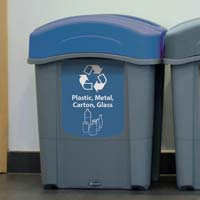 |
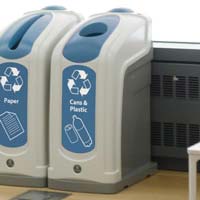 |
||
| Ideal for small offices or siting next to desks to encourage daily collection | Site with other Nexus 13G recycling bins to create a central recycling station |
All Glasdon recycling bins are available with personalized decals, allowing you to collect the waste stream most suited to your needs. You can also add branding or a custom recycling message to encourage participation.
For larger quantity collections, we recommend the Nexus 26G indoor recycling bin, the C-Thru 50G recycling container or the Nexus City 64G outdoor recycling bin for wheeled containers.
| Nexus 26G | C-Thru 50G | Nexus City 64G | ||
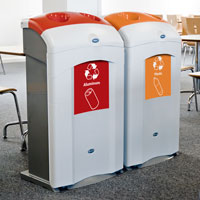 |
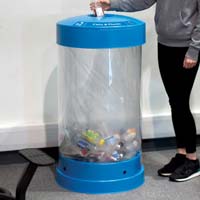 |
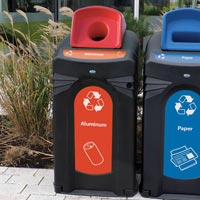 |
||
| Ideal for large offices, retail stores and other high-traffic indoor environments | Site in busy public spaces – transparent body allows contents to be seen | Suitable for high-traffic outdoor environments – collect container types separately or together |
Please note that some States will not allow crushed or flattened containers to be returned so be sure to check your State Bottle Bill guidelines first.
FAQ - How much is the Refundable Deposit Value for Returnable Containers?
The value of the refundable deposit per container varies between State. The deposit amount can also be different dependant on the container or beverage type. To find out the deposit amount for your State, take a look at the above table.
Unclaimed deposits on bottles that have not been returned are either paid to the State where they may be used for program administration or grants, or in some States, these are retained by the retailer, distributor or bottler.
For example, in Michigan, 75% of unredeemed deposits goes to the State to aid the Cleanup and Redevelopment Fund and the remaining 25% is retained by the retailers**.
FAQ - What are the Benefits of Bottle Bills?
States with Bottle Bills have reported numerous successes as a result of their Container Deposit Laws.
Bottle bills...
- Supply recyclable materials for a high-demand market
- Produce high-quality recycled materials
- Create new businesses and jobs
- Reduce waste disposal costs
- Reduce litter by incentivizing recycling
In 2016, New York State reported that their Bottle Bill helped to recycle 5.1 billion plastic, glass and aluminum beverage containers. This totaled over 336,000 tons of recycled material at no cost to local governments***.
Recycling beverage containers through a Bottle Bill also increases the quality of the material compared to single-stream collection systems****. Because this material is collected separately from other commingled recycling materials, it is less likely to be contaminated and thus, will be of a higher quality.
The return deposit value of the container also incentivises recycling for users. Assigning a cash value to the product means people will be less likely to litter the containers. If they are littered, there’s also an increased chance that someone else may pick this material up, helping to keep our sidewalks, parks and beaches free from trash.
Sources:
*http://www.iowadnr.gov/Environmental-Protection/Land-Quality/Waste-Planning-Recycling/Bottle-Deposit-Law
**http://www.bottlebill.org/legislation/usa/michigan.htm
***https://www.dec.ny.gov/chemical/8500.html
****http://www.container-recycling.org/index.php/estimated-yield-rates-from-collected-plastic
N.B. Table contents correct at the time of publishing on 03/28/2018




